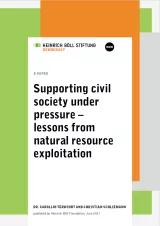Supporting civil society under pressure – lessons from natural resource exploitation
Civil society is under pressure worldwide. This is also true for civil society organisations and activists who protesting against land grabs and environmental degradation; who are standing up for a just utilization of resources and demanding the right to have a say in the matter.
This paper is a reflection of an ongoing research project of the Heinrich Böll Foundation and the European Center for Constitutional and Human Rights, designed to uncover common patterns and dynamics of restrictions on and coping strategies adopted by civil society actors in the specific context of natural resource exploitation.
It draws on case studies in India, Mexico, the Philippines, and South Africa based on desk-research and interviews with communities and organizations. After highlighting the economic context and legal framework behind the growing number of natural resource projects, the paper briefly sketches some common patterns of restrictions, as well the strengths and limits of prevalent response strategies. Current modes of response are predominantly reactive. While such emergency measures are absolutely necessary, they are not enough.
The paper calls for an analysis of the relation between community exclusion from decision-making and subsequent attacks and focuses on consultation procedures, which are thought to enable public participation, but more often end up being part and parcel of the process in which civil society is excluded. Those organizing to counter such exclusion and demanding to be heard are put under pressure to remain silent.
Product details
Table of contents
- Introduction
- Shrinking space and natural resource governance
- Pressures on communities and organizations advocating for sustainable natural resource governance
- The business nexus of restrictions
- Response strategies to counter restrictions
- Shrinking space for consultations about natural resource governance
- Conclusion
